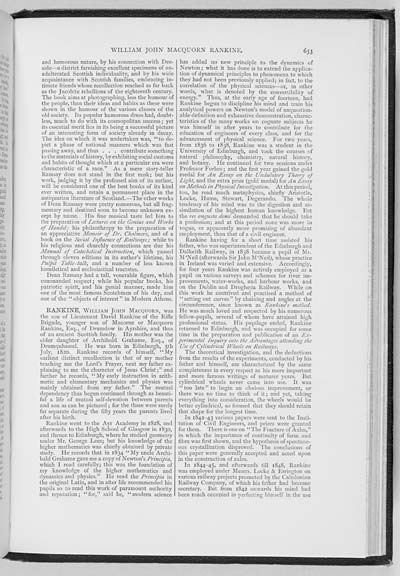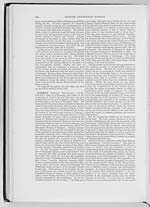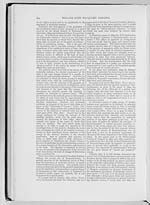Volume 3 > Half-Volume 6
(299) Page 653 - Rankine, William John MacQuorn
Download files
Individual page:
Thumbnail gallery: Grid view | List view

653 and humorous nature, by his connection with Dee- side�a district furnishing excellent specimens of un- adulterated Scottish individuality, and by his wide acquaintance with Scottish families, embracing in- timate friends whose recollection reached as far back as the Jacobite rebellions of the eighteenth century. The book aims at photographing, less the humour of the people, than their ideas and habits as these were shown in the humour of the various classes of the old society. Its popular humorous dress had, doubt- less, much to do with its cosmopolitan success; yet its essential merit lies in its being a successful picture of an interesting form of society already in decay. The idea on which it was undertaken was, "to de- pict a phase of national manners which was fast passing away, and thus . . . contribute something to the materials of history, by exhibiting social customs and habits of thought which at a particular era were characteristic of a race." As a mere story-teller Ramsay does not stand in the first rank; but his work, judging it by the professed aim of its author, will be considered one of the best books of its kind ever written, and retain a permanent place in the antiquarian literature of Scotland.�The other works of Dean Ramsay were pretty numerous, but all frag- mentary and destined soon to become unknown ex- cept by name. His fine musical taste led him to the preparation of Lectures on the Genius and Works of Handel; his philanthropy to the preparation of an appreciative Memoir of Dr. Chalmers, and of a book on the Social Influence of Railways; while to his religious and churchly connections are due his Manual of Catechetical Instruction, which passed through eleven editions in its author's lifetime, his Pulpit Table-talk, and a number of less known homiletical and ecclesiastical tractates. Dean Ramsay had a tall, venerable figure, which commanded respect; while his popular books, his patriotic spirit, and his genial manner, made him one of the most famous Scotchmen of his day, and one of the " objects of interest" in Modern Athens. RANKINE, WILLIAM JOHN MACQUORN, was the son of Lieutenant David Rankine of the Rifle Brigade, younger son of Macorne or Macquorn Rankine, Esq., of Drumdow in Ayrshire, and thus of an ancient Scottish family. His mother was the elder daughter of Archibald Grahame, Esq., of Drumquhassel. He was born in Edinburgh, 5th July, 1820. Rankine records of himself, "My earliest distinct recollection is that of my mother teaching me the Lord's Prayer, next my father ex- plaining to me the character of Jesus Christ;" and further he records, "My early instruction in arith- metic and elementary mechanics and physics was mainly obtained from my father." The mutual dependency thus begun continued through as beauti- ful a life of mutual self-devotion between parents and son as can be pictured; for the three were rarely far separate during the fifty years the parents lived after his birth. Rankine went to the Ayr Academy in 1828, and afterwards to the High School of Glasgow in 1830, and thence to Edinburgh, where he studied geometry under Mr. George Lees; but his knowledge of the higher mathematics was chiefly obtained by private study. He records that in 1834 "My uncle Archi- bald Grahame gave me a copy of Newton's Principia, which I read carefully; this was the foundation of my knowledge of the higher mathematics and dynamics and physics." He read the Principia in the original Latin, and in after life recommended his pupils so to read this work of paramount authority and reputation; "for," said he, "modern science has added no new principle to the dynamics of Newton; what it has done is to extend the applica- tion of dynamical principles to phenomena to which they had not been previously applied; in fact, to the correlation of the physical sciences�or, in other words, what is denoted by the convertibility of energy." Thus, at the early age of fourteen, had Rankine begun to discipline his mind and train his analytical powers on Newton's model of unquestion- able definition and exhaustive demonstration, charac- teristics of the many works on cognate subjects he was himself in after years to contribute for the education of engineers of every class, and for the advancement of physical science. For two years, from 1836 to 1838, Rankine was a student in the University of Edinburgh, and took the courses of natural philosophy, chemistry, natural history, and botany. He continued for two sessions under Professor Forbes; and the first year gained the gold medal for An Essay on the Undulatory Theory of Light, and the extra prize (gold medal) for An Essay on Methods in Physical Investigation. At this period, too, he read much metaphysics, chiefly Aristotle, Locke, Hume, Stewart, Degerando. The whole tendency of his mind was to the digestion and as- similation of the highest human knowledge. But the res angusta domi demanded that he should take a profession; and at this period none was more in vogue, or apparently more promising of abundant employment, than that of a civil engineer. Rankine having for a short time assisted his father, who was superintendent of the Edinburgh and Dalkeith Railway, in 1838 became a pupil of Mr. M'Neil (afterwards Sir John M'Neil), whose practice in Ireland was varied and extensive. Accordingly, for four years Rankine was actively employed as a pupil on various surveys and schemes for river im- provements, water-works, and harbour works, and on the Dublin and Drogheda Railway. While on this work he contrived and practised a method of '' setting out curves " by chaining and angles at the circumference, since known as Rankings method. He was much loved and respected by his numerous fellow-pupils, several of whom have attained high professional status. His pupilage ended, Rankine returned to Edinburgh, and was occupied for some time in the preparation and publication of an Ex- perimental Inquiry into the Advantages attending the Use of Cylindrical Wheels on Railways. The theoretical investigation, and the deductions from the results of the experiments, conducted by his father and himself, are characterized by the same completeness in every respect as his more important and more famous writings of maturer years. But cylindrical wheels never came into use. It was "too late "to begin an obvious improvement, or there was no time to think of it; and yet, taking everything into consideration, the wheels would be better cylindrical, so formed that they should retain that shape for the longest time. In 1842-43 various papers were sent to the Insti- tution of Civil Engineers, and prizes were granted for them. There is one on " The Fracture of Axles," in which the importance of continuity of form and fibre was first shown, and the hypothesis of spontane- ous crystallization disproved. The conclusions of this paper were generally accepted and acted upon in the construction of axles. In 1844-45, and afterwards till 1848, Rankine was employed under Messrs. Locke & Errington on various railway projects promoted by the Caledonian Railway Company, of which his father had become secretary. But from 1842 onwards his mind had been much occupied in perfecting himself in the use
Set display mode to:
![]() Universal Viewer |
Universal Viewer | ![]() Mirador |
Large image | Transcription
Mirador |
Large image | Transcription
Images and transcriptions on this page, including medium image downloads, may be used under the Creative Commons Attribution 4.0 International Licence unless otherwise stated. ![]()
| Biographical dictionary of eminent Scotsmen > Volume 3 > Half-Volume 6 > (299) Page 653 - Rankine, William John MacQuorn |
|---|
| Description | Volume III. Contains names alphabetically from Macadam to Young. |
|---|

